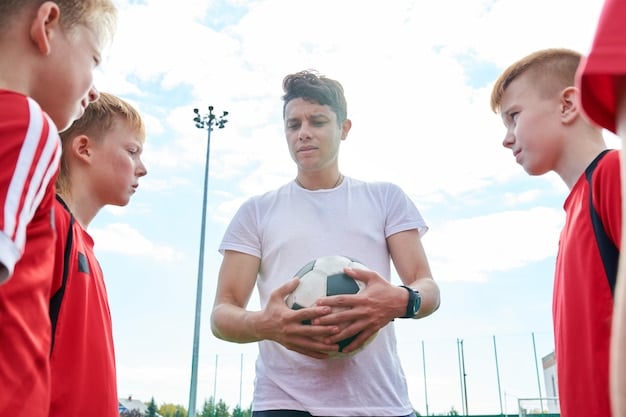Premier League Academies: Spotting England’s Future Stars

Premier League academy systems play a crucial role in identifying and nurturing the next generation of football stars in England, providing young talents with top-tier training and development opportunities.
The Premier League academy systems stand as vital pillars in English football, dedicated to cultivating the next wave of exceptional talent. These renowned institutions meticulously scout, train, and develop young players, nurturing their potential and preparing them for the rigors of professional football. Join us as we delve into the intricate workings of these academies, uncovering the strategies and techniques employed to identify and mold England’s future stars.
Understanding Premier League Academy Systems
Premier League academy systems are designed to provide young footballers with a comprehensive training environment, offering them the best possible chance to develop into professional players. Understanding the structure and purpose of these academies is crucial to appreciating their importance.
These academies are not just about football; they also focus on the academic and personal development of young players, ensuring they have a solid foundation for life, whether they make it as professional footballers or not.
The Structure of Premier League Academies
Premier League academies are categorized into different tiers, each with its own requirements and standards. Category One academies, for example, offer the highest level of coaching and facilities.
The Purpose of Academy Systems
The primary goal is to produce players for the first team, but academies also aim to provide a holistic education, nurturing well-rounded individuals prepared for various career paths.
- Providing top-tier coaching and facilities.
- Offering academic and personal development support.
- Scouting and recruiting the best young talents.
- Preparing players for professional football careers.
In summary, Premier League academy systems provide a structured and comprehensive environment for young footballers to develop their skills, both on and off the pitch, with the ultimate goal of producing players for the first team and beyond.
The Scouting Process: Finding the Gems
The scouting process is a cornerstone of Premier League academy systems, involving extensive efforts to identify promising young players from across the country and beyond. This process is critical for securing the best talent early on.
Scouts attend countless youth games, tournaments, and training sessions, carefully assessing players’ technical abilities, tactical awareness, physical attributes, and mental fortitude.

What Scouts Look For
Scouts look for a combination of technical skills, tactical understanding, physical attributes, and psychological traits when assessing young players. Key qualities include:
Technical Skill: A player’s ability to control the ball, pass accurately, and shoot effectively.
Tactical Awareness: Understanding the game, making intelligent decisions, and positioning themselves effectively.
Physical Attributes: Speed, agility, strength, and stamina are all important physical qualities.
- Technical Skills: Ball control, passing accuracy, shooting ability
- Tactical Awareness: Game understanding, decision-making, positioning
- Physical Attributes: Speed, agility, strength, stamina
- Psychological Traits: Mental toughness, resilience, work ethic
Ultimately, the scouting process is about identifying players with the potential to develop into top-level professionals, assessing not just their current abilities but also their capacity for growth and improvement.
Training and Development: Nurturing Potential
The training and development phase within Premier League academy systems is where raw potential is carefully nurtured and honed. This involves a comprehensive approach that covers technical, tactical, physical, and psychological aspects of the game.
Young players receive expert coaching from experienced professionals, who work closely with them to improve their skills, develop their tactical understanding, and enhance their physical fitness.
Technical Training
Technical training focuses on improving players’ ball control, passing accuracy, shooting technique, and dribbling skills. Drills and exercises are designed to replicate game situations.
Tactical Development
Tactical development involves teaching players about positional play, teamwork, decision-making, and game management. Players learn how to read the game and make intelligent choices.
Physical Conditioning: Strength, speed, and stamina training.
Psychological Preparation: Mental resilience and focus.
- Technical Skills: Ball control, passing accuracy, shooting technique.
- Tactical Awareness: Positional play, teamwork, decision-making.
- Physical Conditioning: Strength, speed, stamina.
- Psychological Preparation: Mental resilience, focus.
In conclusion, training and development in Premier League academy systems is a meticulous process designed to nurture young players’ potential across all facets of the game, preparing them for the challenges of professional football.
Key Figures in Academy Success
Behind every successful Premier League academy, there are key figures who play crucial roles in shaping young talents. These individuals include academy managers, coaches, scouts, and support staff, each contributing uniquely to the development process.
Academy managers oversee the entire operation, setting the vision, ensuring standards are met, and creating a supportive environment for players and staff. Coaches work directly with the players, providing expert instruction and guidance.

Academy Managers
Academy managers are responsible for the overall management and strategic direction of the academy. They set the standards, ensure compliance, and foster a positive culture.
Coaches
Coaches provide expert instruction and guidance to the players, helping them improve their technical skills, tactical understanding, and physical fitness. They develop training programs and monitor players’ progress.
Scouts: Identifying and recruiting talented youngsters.
Support Staff: Providing medical, academic, and welfare support.
- Academy Managers: Overseeing the entire operation and setting the strategic direction.
- Coaches: Providing expert instruction and guidance to the players.
- Scouts: Identifying and recruiting talented youngsters.
- Support Staff: Providing medical, academic, and welfare support.
In summary, the success of Premier League academies depends on the collective efforts of numerous key figures, each playing a vital role in nurturing young talents and preparing them for the demands of professional football.
Challenges and Criticisms
While Premier League academy systems are widely praised for their contributions to football development, they also face challenges and criticisms. Addressing these issues is essential for ensuring the continued success and improvement of these academies.
One common criticism is the pressure placed on young players at a very young age, which can lead to burnout, injuries, and psychological issues. Balancing the demands of football with academic and social development is a significant challenge.
Pressure on Young Players
The intense pressure to succeed can lead to burnout, injuries, and psychological issues among young players. Balancing football with academic and social development is challenging.
Lack of Opportunities
Many talented young players fail to break into the first team, leading to disillusionment and wasted potential. Competition for places is fierce, and the transition from academy to professional football is difficult.
Financial Disparities: Uneven distribution of resources.
Ethical Concerns: Player welfare and exploitation.
- Pressure on Young Players: Balancing football with academic and social life.
- Lack of Opportunities: Difficulty in transitioning to the first team.
- Financial Disparities: Uneven distribution of resources among academies.
- Ethical Concerns: Ensuring player welfare and preventing exploitation.
Addressing these challenges and criticisms is crucial for ensuring the long-term success and sustainability of Premier League academy systems, promoting the well-being of young players, and maximizing their potential.
Success Stories: Academy Graduates Making an Impact
The ultimate measure of success for Premier League academy systems is the number of graduates who go on to have successful careers in professional football. Numerous players have emerged from these academies to make significant impacts on the Premier League and beyond.
Marcus Rashford of Manchester United is a prime example, having progressed through the club’s academy to become a key player for both club and country. Similarly, Harry Kane of Tottenham Hotspur is another academy graduate who has risen to become one of the world’s leading strikers.
Marcus Rashford (Manchester United)
Marcus Rashford is a product of Manchester United’s academy, having joined the club at the age of seven. He has become a key player for the team, scoring crucial goals and demonstrating exceptional talent.
Harry Kane (Tottenham Hotspur)
Harry Kane progressed through Tottenham Hotspur’s academy to become one of the world’s leading strikers. His goal-scoring record and leadership qualities have made him an invaluable asset to the club.
Trent Alexander-Arnold (Liverpool): A local lad who conquered Europe.
Declan Rice (West Ham United): A midfield maestro from the academy ranks.
- Marcus Rashford (Manchester United): A key player for club and country.
- Harry Kane (Tottenham Hotspur): One of the world’s leading strikers.
- Trent Alexander-Arnold (Liverpool): A local lad who conquered Europe.
- Declan Rice (West Ham United): A midfield maestro from the academy ranks.
In conclusion, the success stories of academy graduates like Marcus Rashford, Harry Kane, Trent Alexander-Arnold and Declan Rice highlight the effectiveness of Premier League academy systems in producing top-level footballers who make a significant impact on the game.
| Key Point | Brief Description |
|---|---|
| ⚽ Academy Structure | Categorized tiers offering comprehensive training. |
| 🌱 Scouting Process | Identifying young talents through extensive scouting. |
| 💪 Training & Development | Nurturing potential with expert coaching. |
| 🌟 Success Stories | Graduates making an impact in football. |
FAQ
▼
A Premier League academy system is a structured program designed to develop young football players aged 9-18, providing them with coaching, education, and support to become professional footballers.
▼
Players are scouted through various means, including attending youth matches, tournaments, and training sessions. Scouts look for technical skills, tactical awareness, physical attributes, and mental qualities.
▼
Academy players receive comprehensive training that covers technical skills, tactical understanding, physical conditioning, and psychological preparation. Coaches focus on developing all aspects of the game.
▼
Academy players face challenges such as intense pressure to succeed, balancing football with academic and social life, and the difficulty of transitioning to the first team due to high competition.
▼
Successful Premier League academy graduates include Marcus Rashford (Manchester United), Harry Kane (Tottenham Hotspur), Trent Alexander-Arnold (Liverpool), and Declan Rice (West Ham United), among others.
Conclusion
In conclusion, Premier League academy systems represent a vital component of English football, dedicated to identifying, nurturing, and developing the next generation of stars. While challenges and criticisms persist, the success stories of academy graduates highlight the effectiveness of these systems in producing top-level footballers who make a significant impact on the game.





